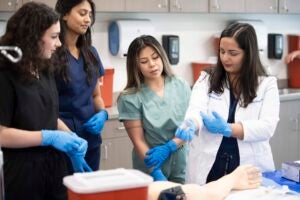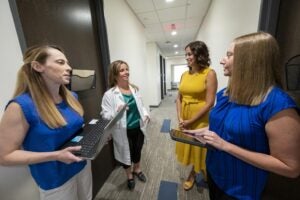What are the Guaranteed Admissions programs?
Pitt’s Guaranteed Admissions Programs (GAP) offer students a secure pathway to graduate study, ensuring admission to select Pitt graduate programs while allowing them to pursue any* undergraduate major that aligns with their interests and career goals. While it does not shorten the time required to complete a degree, you will gain special access to faculty, current students and opportunities to learn more about the field throughout your undergraduate studies.
Students applying to Pitt as first-year undergraduate students may be eligible for the GAP offered by select SHRS graduate programs. Answer the question “Would you like to be considered for a Guaranteed Admission Program?” on your first-year application to be screened for a guarantee.
SHRS Guaranteed Admissions Programs include:
*The Communication Science and Disorders Guarantee requires students to complete an undergraduate degree in Communication Science (BA).
I received notification that I have been placed on the waitlist – is the waitlist ranked, and how can I find out about my position on the waitlist?
The University of Pittsburgh Physician Assistant Studies program does not utilize priority ranking for the waitlist. If a student has been placed on the waitlist, the student has been deemed qualified for admission. By nature, the waitlist process is extremely unpredictable and fluid, as it is dependent upon the decisions of our admitted students throughout the entire admissions cycle.
The program cannot guarantee that we will visit the waitlist during a given admissions cycle. With this in mind, waitlisted students will be notified of their status and updated regularly throughout the admission cycle. Students may be invited from the waitlist leading up to, and after, the start of our program in January. All applicants, including waitlisted students, will be notified when the class has been filled and the admissions cycle has officially ended.
The admissions committee and the entire PA program faculty and staff realize that being on the waitlist can be a stressful and uncertain time, and we will contact you immediately if there are any changes to your application.
What if there is not a clinical site in my area?
Students can work with program faculty and staff to find supervised clinical practice experiences in their preferred area. The team will do their best to ensure students have clinical site options in their preferred area, when possible. While the program considers student preferences, the program cannot guarantee that all requests will be accommodated. Students should expect to complete four (4) Supervised Clinical Practice Experiences (SCPEs) within approximately 100 miles of their preferred geographic location, when feasible. The remaining four (4) SCPEs may require travel to sites more than 100 miles from their preferred location.
What do I do about health insurance during the program?
Health insurance coverage is required while enrolled in the Physician Assistant Studies Hybrid Program and is available for students and their families through the University. Insurance packages will only be available to students beginning in December. If you plan on purchasing insurance through the University, it is okay to wait until December 1 to enroll/submit documentation on EXXAT.
What resources are offered for a hybrid student at Pitt?
The program, department, School of Health and Rehabilitation Sciences and the University of Pittsburgh offer a wide variety of student resources such as student advising, online library access, IT troubleshooting, Human Resources, Accessibility Services, SHRS Affinity Groups and more. Please visit the links below for more information:
What is the average grade point average (GPA) for accepted students?
Each cohort is individual and as such the average GPA for accepted students varies. Qualified applicants must hold a bachelor’s degree from an accredited institution. They should have a “Cumulative Undergraduate” GPA of 3.0 (based on 4.0) in all undergraduate- and post-baccalaureate-level coursework and a minimum GPA of 3.0 (based on 4.0) in the prerequisite science courses. Exceptions may be made for candidates who present compelling evidence of success in graduate coursework, including successful completion of a graduate-level program.
Can I work during the program?
Acceptance into program requires a full-time commitment. It is an intense and rigorous program that can be demanding.
The program strongly discourages students from holding an outside job during the didactic and clinical years. Students are not required to work for the program or permitted to serve as the primary instructor for any component of the curriculum. Students must not substitute for or function as instructional faculty and clinical or administrative staff.
Students are not permitted to substitute as clinical or administrative staff during the supervised clinical practice experiences. Employment is not an acceptable excuse for class absence, missed or late assignments or poor performance.
Will the program accept transfer credits?
The program does not currently accept transfer credits.
Advanced placement, defined as a waiver of required coursework included in the physician assistant studies curriculum for applicants to the program and/or a waiver of required coursework included in the physician assistant studies curriculum for currently enrolled students in the program which results in the student advancing in the curriculum without completing required curricular components at the University of Pittsburgh, is not an option in this program.
Am I required to move to Pittsburgh to complete the program?
No. Students are welcome to move to Pittsburgh to complete the program, however, it is not required. Students who live in Pittsburgh will not have access to, or be able to attend, any on-campus program labs or lectures.
Is there an expiration date on courses/degrees?
No. There is no expiration date for prerequisite courses. Learn more about prerequisite courses on the Admissions page.
If you still have questions please contact the enrollment specialist at PittPAHybrid@shrs.pitt.edu for additional information.
What types of experience will NOT be accepted towards the 500 hours of patient care experience?
The following will not be accepted as patient care experience:
- PA or physician observer or shadowing
- Non-clinical research assistant positions
- Candy striper or junior volunteer positions
- CPR or ACLS instructor
- Wilderness medicine instructor
- Patient transporter or sitter
- Pharmaceutical representative
- Ski patroller
- Life guard
- Aerobics instructor
- Unit clerk or insurance clerk
- Medical secretary or other clerical positions
Are there community engagement projects and programs I can participate in?
Community engagement opportunities both local, regional and international are accessible during a student’s time in this program. The following is a list of just some of the opportunities offered to Pitt PAS students:
- Future Health Care Providers Outreach Program (FHCPOP)
- Street Medicine and other connections with Pitt’s Medical School
- Homewood Home Health Program and Homewood Senior Station
- Remote Access Medical Trip
- Floating Doctors Panama – available to both didactic and clinical year students. A medical trip providing care to underserved communities.
- The Hub – Pitt Vaccination Center Volunteering
Learn more about these offerings, initiatives and more on the Department of Physician Assistant Studies page.



